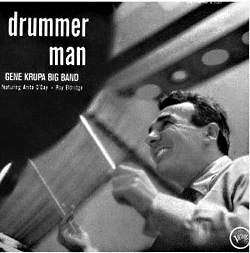Music critics have a terrible time admitting their gaps in knowledge. There are few things that make my skin crawl more than listening to other writers trying to outfox each other with obscure artists and B-side trivia. Conversely, there’s nothing more refreshing than one who is willing to raise his hand and say, “Actually, I have no prior knowledge of Betty Davis‘ influential role in funk-rock history; please tell me more.” Why is this so difficult? The way I see it, once you think you know everything about music history, you may as well sell all your vinyl and put that vintage Marantz receiver in hock, because you’ve effectively surrendered your intellectual curiosity in exchange for a smugly satisfied ego stroking.
In the spirit of these beliefs, I have to cop to a major history lesson I received this past weekend. Somehow, despite a particularly strong affection for percussion, I had never heard of Gene Krupa. In the event that you are as in the dark as I was, here’s the deal: Modern drumming as we know it wouldn’t even exist if it weren’t for Krupa’s stylistic and technical adventurousness.
The son of Polish immigrants, Krupa first made a splash in the mid-’30s as the wunderkind drummer in Benny Goodman‘s band. His fondness for Slingerland drums helped make them one of the most popular models of all time (just say “Slingerland” around almost any contemporary rock drummer and watch them dork out), but it was his determination to improve existing drum kits that has made him such a crucial historical figure.
He had already made history in 1927 by being the first drummer to record using a bass drum pedal, and he went on to work extensively with Armand Zildjian (if you’ve ever seen live music, you’ve seen that last name engraved on a cymbal) to develop the hi-hat cymbal stand. He even has a linguistic legacy, having coined the descriptive terms “crash cymbal’ and “ride cymbal.” What’s more, without him, we wouldn’t have floor toms or hanging toms. Just try to imagine John Bonham getting by without those tools. Oh, and while I’m on the subject of classic-rock drummers, Krupa is cited as a formative influence by Rush’s Neil Peart, Blue Cheer’s Paul Whaley, the Who’s Keith Moon, and especially KISS drummer Peter Criss, who actually took personal lessons from the man. Damn, I really need to start paying attention in class more often.
In other continuing-education matters, reports from the field on the success of this past Thursday’s “The Night the Music Died” public-awareness campaign against the mayor’s proposed nightlife regulations have been mixed, with some clubs reporting either absent-minded indifference (such as the downtown club that simply forgot to shut down liquor service and live music at midnight as planned) or fiscal irritation (such as the Fremont venue that turned the music back on as soon as thirsty patrons began heading for the door). However, I did see plenty of dialogue sparking about the campaign at the Noise for the Needy benefit I was attending that night at the Sunset, and Crocodile booking agent Pete Greenberg saw the simple gesture as an encouraging start to something bigger and broader. “I’m really impressed with the way so much of the community has banded together to combat such a frightening prospect,” he said. “It’s great to see so many participating [clubs], and we’ll definitely continue to do all we can to keep Seattle’s music scene alive and well.”
Speaking of our scene being alive and well, I can think of no better sign of our sonic fitness than the long-overdue return of the beloved local dance-punk band that will hit the stage of the Comet this Friday, April 27. Out of respect for bad-ass booking agent Michelle “Mamma Casserole” Smith, I can’t tell you exactly who will be headlining after the Catch and the Lashes open the show, but trust me, you’ll want to be there.
Finally, Georgetown music fans have reason to be pleased beyond the increasingly impressive state of Jules Maes‘ calendar (Steel Tigers of Death, Siberian, and the Intelligence are just a few of the noteworthy acts recently booked). The southern neighborhood will welcome a new venue this summer in the form of the indoor-outdoor stages being built next to Pig Iron BBQ. Apparently they are adding chili to the menu, along with quality live music, because the venue has been christened Last Chance Chili and the booking agent is none other than former Sunset calendar wrangler Kwab Copeland.








